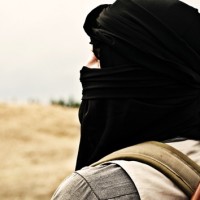
 iStock/Thinkstock(NEW YORK) — Five years ago Friday, American-born al-Qaeda cleric Anwar al-Awlaki was traveling between dusty towns in Yemen in a two-car convoy when a pair of Hellfire missiles launched from Predator drones ended his life and the lives of everyone in his small entourage.
iStock/Thinkstock(NEW YORK) — Five years ago Friday, American-born al-Qaeda cleric Anwar al-Awlaki was traveling between dusty towns in Yemen in a two-car convoy when a pair of Hellfire missiles launched from Predator drones ended his life and the lives of everyone in his small entourage.
The killing of al-Awlaki, a New Mexico native, without charges or trial, on Sept. 30, 2011, remains one of the most controversial counter-terrorism operations since 9/11. The U.S. government contends that in addition to his propaganda that fueled lethal plots the world over, al-Awlaki was directly involved in operational planning for al-Qaeda and was therefore an “imminent threat.”
Killing him should have ended that threat. But then earlier this month, a young man who allegedly planted a series of bombs in New York and New Jersey was found with a journal in which he apparently had written that it was al-Awlaki who told him to do it.
“I looked for guidance and [praise be to God] guidance came. Sheikh Anwar [al-Awlaki,] Brother Adnani … said it clearly attack the kuffar [unbelievers] in their backyard,” a journal purportedly belonging to bombing suspect Ahmad Rahami says, also referring to the late ISIS spokesperson Abu Muhammad al-Adnani.
It was the most recent, but hardly the first time al-Awlaki’s name has come up in the wake of terrorist attacks both in the U.S. and abroad.
Law enforcement officials have told ABC News that al-Awlaki’s English-language sermons or other extremist materials are often found on the computers of those who carried out attacks or were arrested on terror charges — dozens of them in the past few years. To name some of the more high-profile cases:
- San Bernardino, California. Dec. 2, 2015. Fourteen innocent people killed. A friend of shooter Syed Rizwan Farook allegedly listened to al-Awlaki’s sermons and the two together pored over Inspire magazine, the publication produced by al-Awlaki’s al-Qaeda affiliate, al-Qaeda in the Arabian Peninsula (AQAP).
- Chattanooga, Tennessee. July 16, 2015. Five innocent people killed. Gunman Mohammod Abdulazeez followed al-Awlaki’s teachings online beginning as least as far back as two years before the attack, officials told ABC News at the time.
- Garland, Texas. May 3, 2015. No innocent people killed. Of the two gunmen, who were killed in the attack by police, one used a photo of al-Awlaki on a social media profile and the other gave CDs with al-Awlaki material on them to his mother, according to The New York Times.
- Boston, Massachusetts. April 15, 2013. Three innocent people killed. Boston Marathon bomber Dzhokhar Tsarnaev allegedly praised al-Awlaki on Twitter and encouraged his followers to listen to him.
In case after case since his death, the ghost of al-Awlaki has haunted U.S. counter-terrorism officials and, in the eyes of a former U.S. national security official, his legacy has come to symbolize the evolved threat that the U.S. faces today from homegrown terror.
“Here’s an individual who died five years ago, and yet today as we are investigating attacks in this country, [he] is still a major figure and his words are still influencing people,” said John Cohen, a former top counter-terrorism official at the Department of Homeland Security and a current ABC News contributor. “It just demonstrates the incredible influence that social media and the internet have now on inspiring people.”
J.M. Berger, a terrorism expert, said al-Awlaki’s message continues to be particularly pervasive because, having lived in the U.S. for so long, he knew how to speak to Westerners.
“His work was very powerful, emotionally,” Berger told ABC News. “He was a very good storyteller, and his stories served the narrative he wanted to promote.”
The ideas that he promotes, in videos and audio messages online that circulate endlessly in jihadi networks, include how the U.S. is at war with Islam and that it’s every Muslim’s duty to kill Americans, especially Muslims in the West.
“That was the whole purpose around al-Awlaki, a big part of his agenda, to speak to the English-language community and the Western recruits,” said Nada Bakos, a former CIA analyst who specialized in counter-terrorism.
Following the shooting in San Bernardino and the revelations about al-Awlaki’s connection to it, White House Press Secretary Josh Earnest was asked if President Obama regretted ordering his death — essentially, had killing al-Awlaki made him a martyr and a rallying cry for jihadists?
Earnest said that Obama had concluded that, due to his purported operational role in al-Qaeda as well as the propaganda, the U.S. was safer with al-Awlaki “off the battlefield.”
And while al-Awlaki’s controversial death may indeed have raised his profile even further, Berger said that it’s “hard to see how taking him out was a mistake.”
“While some argue, correctly, that his work will continue to be influential even after his death, I think people tend to underestimate the importance of novelty in propaganda,” Berger said. “[H]is works have become classics, [but] there are no new al-Awlaki messages to stoke excitement.”
“It’s important to acknowledge his influence will continue to be felt in the jihadist movement, but he’s frozen in time now,” he said.
Bakos said she expects al-Awlaki will continue to pop up in terrorism investigations in the coming years.
“Unless someone comes along and replaces him with the same articulation, the same senior role in an organization, he’s not going away,” she said.
Copyright © 2016, ABC Radio. All rights reserved.















